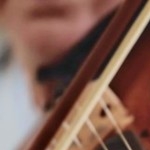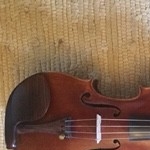What’s challenging you now?
Home » Forums » Share Your Practice » What’s challenging you now?
- This topic has 24 replies, 17 voices, and was last updated 1 year, 5 months ago by
 Kvmceff.
Kvmceff.
-
AuthorPosts
-
-
February 21, 2023 at 5:50 am #63339
 jason kleinbergKeymaster
jason kleinbergKeymasterI’ve returned to the FUNdamental skill of slurs across strings. I’m practicing it with patterns and fingerings to make it challenging. Slowly building up speed.
I’m also working on chordal double stops.
What about you?
-
February 21, 2023 at 6:21 am #63340
Beverly Weber
ParticipantI’m bowing challenged! I’m confused about which bowing pattern to use with a reel, jig, polka, etc. and in which style -Irish, Appalachian, etc. I’d like a lesson or two on the possibilities and also some bowing suggestions on the sheet music.
-
February 21, 2023 at 1:44 pm #63367
 jason kleinbergKeymaster
jason kleinbergKeymasterWhen in doubt, play, it is simply as possible. Let variations and other ideas emerge organically. Listen to a lot of fiddle music to help you get the field and get to this point of natural variation.
-
-
February 21, 2023 at 6:24 am #63341
Sue
ParticipantI have recently started private lessons. My teacher was a competitive fiddler, traveling around to different competitions. She is very strict about bow direction, something that I have only paid a bit of attention to. I now feel that it has become my main focus and I am finding it very difficult to unlearn the habits I have developed from several years of playing. I have no doubt that I will get it eventually but I really feel that I really have to slow down and relearn certain things. It’s hard to break old habits. “Slow down to speed up” Right now this is my biggest challenge.
-
February 21, 2023 at 1:25 pm #63359
 jason kleinbergKeymaster
jason kleinbergKeymasterIf your teacher has marked out all the bowings for tune, play very small sessions slowly. Then speed them up to faster speed. Try to feel the calmness in your body when you start to get it is slow tempo.
-
-
February 21, 2023 at 7:15 am #63344
Juliamary
ParticipantI’ve only recently got onto double stops and need to practice them a lot. Also string crossing.
I also need to improve the dynamics of tunes I know well.
I confess that I haven’t yet paid any attention to bowing technique.How much does it matter in fiddling?
My brain ticks away slowly and I know that I’ll never be able to play very fast.I do wonder why so many fiddle tunes are playing at 100 miles an hour when the lovely melodies sometimes get lost in the relentless speed. That’s my excuse anyway!
I started FiddleHED lessons in November 2021. Absolutely love it. Only wish I’d started earlier. My 70th birthday is on the 5th March.(We’re having. Ceilidh).
I’ve got a lot of catching up to do.❤️🎻-
February 21, 2023 at 1:48 pm #63371
 jason kleinbergKeymaster
jason kleinbergKeymasterGood general practice tip is to practice everything on single notes. So practice one double stop until you can really do it well. Or practice dynamics on a single now. For example, play Ace notes as quietly as possible with a millimeter, phone, like a whisper. And then gradually get louder, using the full bowl until it’s ridiculously loud. Go back-and-forth a few times like that. Then you can do the same sort of practice on slightly bigger chunks, 2 to 6 notes.
-
-
February 21, 2023 at 7:34 am #63346
 PattyParticipant
PattyParticipantI am a victim of new tunes. I keep learning new ones but tend not to spend enough time on any one tune to really get it where I want it musically. And I don’t do enough scale work. SO… I am going back to the early tunes and spending more time on them, focusing on each key, and I’ll save the new tunes for the end of my daily practice.
-
February 21, 2023 at 2:11 pm #63376
 jason kleinbergKeymaster
jason kleinbergKeymasterThat’s really wise and insightful. It’s good to have a balance between things you don’t know, yet things that are partially mastered, and things that you can play with the flow. Don’t let too many things collect in the partially mastered category.
-
-
February 21, 2023 at 7:57 am #63347
 MiriamParticipant
MiriamParticipantRhythmic patterns is on my agenda. I’m playing in the Olympia Volunteer String Band this year and two of the tunes are way out of my ability’s so I will be doing a rhythm shuffle bowing. It’s more difficult to memorize because I don’t hear a clear melody, but I’m up for the challenge:/
-
February 21, 2023 at 11:43 am #63357
 Joanne IlesParticipant
Joanne IlesParticipantI’ve taken the recent tips to learning a tune from a recording & trying to learn Lonesome Moonlight Waltz from an old recording of Bill Monroe & Kenny Baker. I’ve made some tab notes from what I’ve recognised so far & have the tune in my head just working on getting it to my fingers & fiddle!
-
February 21, 2023 at 1:39 pm #63365
 jason kleinbergKeymaster
jason kleinbergKeymasterWhat music do you have to learn for the string band?
As much as possible, try to play rhythms on single strings. I call it extracting the rhythm. Knowing the practice by doing it on simple tunes.
-
-
February 21, 2023 at 2:16 pm #63377
Rick Pallister
ParticipantDouble stops continue to be a challenge for me, particularly hitting them in good tone and in good time in the tune. I find it harder to make them cleanly while up-bowing.
-
February 21, 2023 at 2:40 pm #63378
Valdon Smith
ParticipantTrying to memorize tunes easier so that it doesn’t take so long.
-
February 21, 2023 at 2:43 pm #63379
Valdon Smith
ParticipantTrying to be more efficient in memorizing tunes. Also to retain them better.
-
February 21, 2023 at 3:37 pm #63380
cynhrossi
ParticipantI’ve been learning some new tunes by ear and playing scales. I’m working on Dvorak’s Largo/Going Home, Loch Lomond, and a few others.
I really enjoyed the lesson on The Old Gray Cat because of the challenge of learning those quarters out of order. While I could play each of the quarters when we were doing call-and-response for them, when it came time to connect them, I could not connect them easily. My brain fumbled in frustration and was not sure where I was. I did not readily connect the song as I heard/remembered it and the quarters as Jason played them. So I’m going to try this: go back through the quarters with call-and-response, start chaining the quarters. I’ll use looping as I work through the quarters. I prefer not to use the music, preferring instead to work on ear training.
It would be fun to have a call-and-response lesson with chords.
What I’m reading — The Art of Learning by Josh Waitzken — I’m trying to figure out where the disconnect in my brain/ear is and what I might do to practice through that.
I’ve also just started Livewired: The Inside Story of the Ever-changing Brain by David Eagleman — about plasticity of perceptions; this might enable me to see how to make changes that will help me make these connections. I really love learning by ear. And I’m always curious about how to overcome my frustration, what seems like a wall.
-
February 21, 2023 at 7:48 pm #63383
Gail Foray
ParticipantI’m still struggling with double stops. The only ones that sound okay are the open string chords. Im finding it impossible to not hit unwanted strings with my apparently large, round fingertips! 😩
-
February 22, 2023 at 11:38 am #63390
Amy
ParticipantFirst, I found a tune on the fiddle quick You Tube channel that I will play for my grandkids one day even if it’s on my death bed. It’s called “Who Shit In Grandpa’s Hat?” It’s as danceable as “Maggots In The Sheep Hides” or “Hog Eye And A Tater”.
My string crossing is giving me fits. The sound is so bothersome I can’t think. I keep my fiddle beside me & so decided 2 or 3 times a day for a week (plus picking it up every now & then just to scratch the itch) I’ll work on string crossing in every way I can think of.
I put away everything with music on it because I’m easily distracted. I started out just open string crossing until it got boring so I made up games.First I have to do slow bows, 3 each,⬇️-⬆️ crossing from G-D across to E-A. Across and back perfectly, I WIN. Then the same only . ⬆️-⬇️. I’m whittling down the number of attempts it takes before I can give myself a round of applause.
My bow is divided into quarters so I do the same but with individual quarters. Crossings at the very tip quarter is known to induce cussing.
This last part pointed out a beginner problem I’m determined to stop. Timid bowing. I started last Friday, played my games and by Monday was getting bored. So new game, randomly chose a section of the bow, a pattern ie⬆️⬆️-⬇️or⬇️-⬆️ etc., then a number. If I choose the bow middle, crossing any particular pair of strings, can I manage my bow speed and distance to get to the frog or tip in whatever number of repetitions ⬇️&⬆️ I chose. I hope this is making sense.
I saw that I’m bowing like I’m asking, not bowing like I’m telling. You gotta bow like you mean it, like you know what you’re doing & that one thing made me start over. Now I’m gaining control & confidence. I don’t mean going fast. As beginners, I think we are afraid of that dying cat sound & we (I) tighten up a split second before we create sound. I’m finding I can have a nice sound going slow or beginner fast. My string crossing has improved tremendously. Plus, if it’s wrong, being timid won’t make it less wrong. One more day to go. I’ll go back to routine. I’m pondering a week of intonation. I can hear being off by just a little and the sound makes my eye twitch.
Your pep talks in the videos spur me on, thank you so much. Please keep it up. I have to get good enough to play one of the tunes I mentioned at the beginning of this never ending, long winded,for the love of God please stop, comment.
Jason you’re definitely the GOAT.
-
February 22, 2023 at 12:08 pm #63392
Iona
ParticipantI’m trying to incorporate slurs into tunes I already know.
This presents quite a challenge to me as some of the songs I’m working with I have played for a couple of years the same way.
New brain work, but that is a positive thing! -
February 23, 2023 at 7:56 am #63435
kjdebolt
ParticipantI am working on a song that requires the 3d position. That is really tough for me.
-
February 25, 2023 at 5:14 pm #63551
 KvmceffParticipant
KvmceffParticipantIt will come when the hand memorizes where it is supposed to be in relation to the fiddle. My palm touches the body of the fiddle and that feeling is how I know where I am.
Also doing one finger scales helps teach the hand and ear. You can just do open, first finger, move first to where 2nd would fall, move 1st to where 3rd would fall (if were still in first position) and check with open string. Then go back down (instead of completing the entire scale).
-
-
February 23, 2023 at 9:45 am #63439
Josie
ParticipantI’m working on improving my string crossing and vibrato, also that technique of drilling down to the smallest thing that’s wrong in a tune and finding ways to make it work. The Fiddlers’ Playground exercises are very helpful, though the slurs and slur patterns are challenging. Any tips re 4th finger vibrato? Lately I’ve been working on learning scales better and play them different ways plus with vibrato as practice. I recently renewed for 2023 and continue to love the lessons and appreciate the incredible amount of resource material available. Still rather tentative about recording myself, and generally have this (irrational) fear that, even though I generally practice daily, that I won’t make progress. Fear of success perhaps? Not sure! Anyway, thank you, Jason for all you do. Tremendously grateful!
-
February 25, 2023 at 8:39 am #63526
margaret Olscamp
ParticipantMy bowing is relatively straight but it keeps sliding towards the bridge. Also, I can’t seem to keep a light touch with the fingering of my right hand.
-
February 25, 2023 at 5:08 pm #63550
 KvmceffParticipant
KvmceffParticipantThat’s been happening to me too. So I’m learning to check in with my box elbow and see if it is too high for the string I am on. I also heard one teacher say to aim for the back of the left foot. I think that was meaning that perfectly straight bow might mean the arm is different ( has a different aim/angle) on the lower strings vs. the higher strings.
And finally I have checked to make sure I have proper rosin on the bow and that my strings are wiped fairly clean. You can use wipes for eye glasses every once and awhile, but cover the fiddle so nothing drips on the finish. Otherwise a dry cloth after every session on the fiddle is a good way to keep strings and fiddle clean.
-
-
February 21, 2023 at 1:23 pm #63358
 jason kleinbergKeymaster
jason kleinbergKeymasterIf your teacher has marked up Boeings for tunes, and work on small chunks with a Metronome. Try to master them at slow tempo’s and then at your fastest tempo. Enjoy the physical feeling of playing something really slow and having it settled into your body..
-
-
AuthorPosts
- You must be logged in to reply to this topic.
